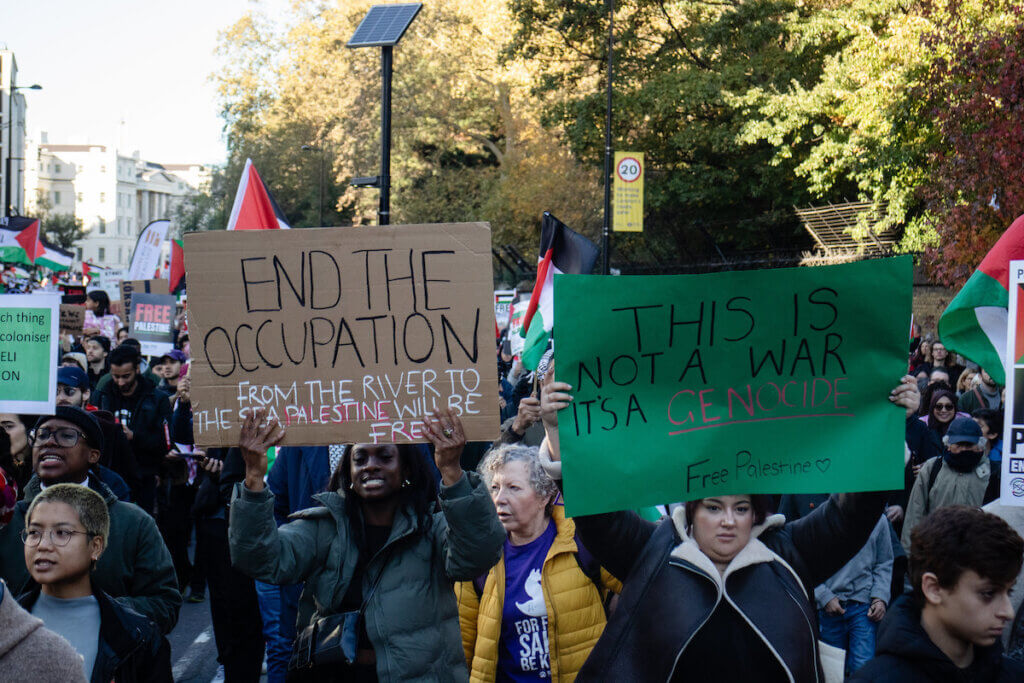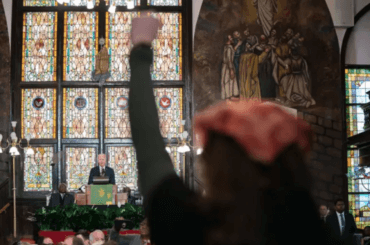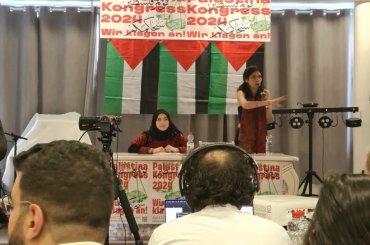In the maelstrom of deeply upsetting tweets in the last month, as the world turned its attention once again to Israel and Palestine following the October 7th attacks on Israeli citizens, the one which broke me was from Belal Aldabbour in Gaza which reads: “Soon, the last sliver of electricity and connection will be exhausted. If I die, remember that I, we, we’re individuals, humans, we had names, dreams, and achievements, and our only fault was that we were just classed as inferior”.
It has always been difficult to talk about my Palestinian heritage, growing up in London. Most often, talking about Palestine is met with a kind of icy bemusement – a quick glance over my shoulder to see if help is arriving in the form of someone else to talk to. Sometimes, it’s met with total blankness, an unwillingness to engage in any way at all. I have had so many conversations which are at once deadening and totally enraging, where I talk about the realities of the occupation of Palestinians – my family included – in the West Bank, only to be mutely nodded at in response. And on rare occasions, I am expected to engage in debate, to treat the matter as one of political interest and not of human suffering.
Anyone I have met who has spent time in Palestine can remark upon Palestinians’ generosity and humor. On a boiling hot August day in the Old City we were given endless cups of tea, bottles of water, offers of shade. In shops in Bethlehem I was teased for my poor Arabic as small gifts were pressed into my hand – magnets and keyrings with the Palestinian flag painted on. They would not need to be generous or kind to deserve to live, to have rights, to be seen as human beings. It feels cloying and almost embarrassing to share these stories, as though these small glimpses of a person are what makes their life matter. But these stories of their humanity are rarely told, and the disregard for their personhood has to be called what it is – racism, or Islamophobia, or both at once.
Unfortunately, I have discovered that Palestinians are not granted empathy automatically: such platitudes and cliches are often necessary to unearth it. The weight of this responsibility can be witnessed across news channels globally, as Palestinian voices, advocates and experts are brought on air to be pummelled with accusations, are forced to denounce again and again the actions of Hamas as they try to detail the suffering of innocent Gazans, are interrupted and goaded and treated like second class citizens even on a platform they were presumably invited onto.
It should be obvious that two million people living in Gaza are just ordinary people trying to live their lives – it is, in fact, hotly contested. This is a war of public opinion in the West, and anyone with any understanding of the conflict and the 75 year Palestinian struggle knows that unless these slaughtered Palestinians are proven as being perfect saints and pillars of their communities, their deaths are glossed over – or treated as a justified murder of a “human animal”. This is why Palestinian children can be routinely shot dead by the IDF, but that’s fine because they were throwing stones – they were criminals, of course.
Things just seem to keep happening to Palestinians. They die – while Israelis are murdered. Their houses “collapse“, rather than being struck by missiles. They somehow “receive bullet wounds” – don’t ask us how! Their lives are viewed as being at the behest of mysterious outside forces, like people suffering from the consequences of a natural disaster. Neutrality breeds neutrality – it instils a feeling amongst observers in the West that their pain is an inevitability. That, somehow, they deserve it.
Now Suella Braverman, before being sacked as Home Secretary, deliberately muddied the guidelines about whether or not it is a crime to display the Palestinian flag. Now she deliberately stokes the far right, in an effort to intimidate people from displaying their solidarity at marches and protests. Now we are having to share posts and write pieces such as this to beg our warmongering politicians and braying public to remember the 4000 children killed in Gaza so far had names, had dreams, had futures filled with possibility which now have been ripped away.
But as each day passes, the tide feels as though it’s turning millimeter by millimeter. On Saturday, the atmosphere amongst the 800,000 people marching in London for a ceasefire and a free Palestine was more ebullient than recent weeks. Perhaps it was the sunshine, or perhaps it was something born out of a shared feeling of defiance. Together we walked – Arabs, Muslims, Jews, queer people, the old, the young, families, people walking alone, people who have traveled the length of the country to be there, dogs in keffiyehs – allegedly marching for hate. Almost a million people knew they would be tarnished with that brush by our politicians, the media, and bigots online and turned up anyway. The rope of humanity that tethers us all together, that in recent years has felt sometimes too difficult and coarse to hold – on that march, we carried it together, and I felt something almost like hope.
The Palestinian spirit is one of inextricable resilience. It is something I remind myself of in tough personal moments, which, of course, pale in comparison to the life of a Palestinian in their native land. Still – it is in my DNA to carry on, and I have to believe that Palestinians will overcome because that’s what they do. But the human spirit can only take so much – there’s a limit to how much Palestinian achievements can be ignored, those names can be forgotten, those lives can be stamped out. In the West, from our safe beds, while we can feel this fear, we cannot be paralyzed by it. The least we can do is to keep marching together, to remind the world of their humanity while we still can, and to demand an end to the violence and to the occupation. It will, in time, become the shame of a generation that we ever had to do so.



If this is a ‘war of public opinion in the West’ (as stated by Brent) – than to me it clearly shows how rotten and degenerate the West is. Public opinion decides who lives or who dies?
“This is a war of public opinion in the West.”
_______________________________________________
In public opinion campaigns, its important to engage as thoughtfully and ethically as possible. Campaigns are not “begging”. They are “taking what is rightful”.
See the following link for a Public Relations perspective. “Know what you are saying. What you are doing. You can’t just throw words around.”
https://www.youtube.com/shorts/xUEfPFq3Q10
“Remember that I, we, we’re individuals, humans, we had names, dreams, and achievements, and our only fault was that we were just classed as inferior”. That statement could have been made as well by any of the 1200 or 1400 people viciously and savagely murdered up close and in person by the ghouls and demons of Hamas who beheaded some of them, slashed the throats of others and stabbed still others. If you want to receive empathy, offer empathy. None of Mondoweiss’ contributors or commenters has done so yet.